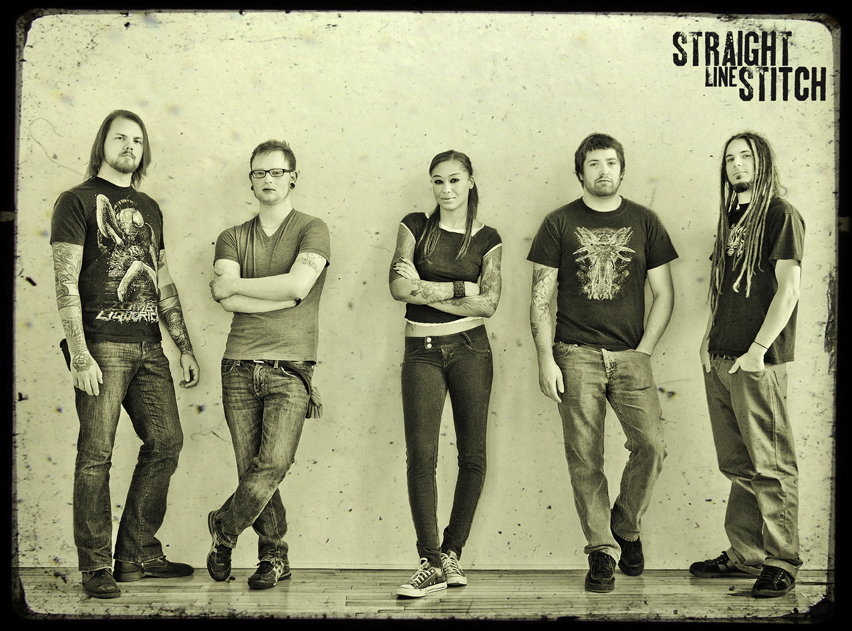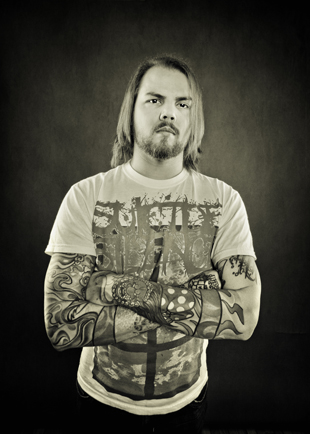Interview: Bassist Jason White Discusses the Present and Future of Straight Line Stitch

Two nationally distributed albums into their career, Straight Line Stitch are free agents again, back on the road with a new guitar team and options open for their next album.
Changes are nothing new to the band, which was formed 12 years ago in Tennessee. Vocalist Alexis Brown joined in 2003; bassist Jason White in 2006. By the time they signed with Koch Records imprint Raging Nation, the group had released a demo, an EP and one album, To Be Godlike. For Koch, they released When Skies Wash Ashore in 2008; in 2011, The Fight of Our Lives, produced by Johnny K, peaked at No. 5 on Billboard’s Heatseekers chart.
Straight Line Stitch closed out the year playing a stretch of European dates with Lacuna Coil and began 2012 with personnel changes. Former drummer Ian Shuirr rejoined the group, and two new guitarists, Kris Hawkins and Nathan Palmer, now complete the lineup.
Jason White was gigging in Atlanta when he filled in with a friend’s band for a show at the Masquerade club. It was an opening slot for Straight Line Stitch, and two weeks later, when they needed a new bass player, he got the call. He accepted the offer, put his things in storage and has been on tour and in the studio with them ever since.
White phoned in as the band prepared for another trek through the Southeast.
Your story is pretty well known: You took up bass because your brother played guitar, but you played it like a guitar, then incorporated that into your bass techniques. Did the hybrid style make it more challenging for the drummers you worked with in terms of locking into a groove with you?
Actually, no. I’ve taken the styles of different drummers I’ve played with and used a lot of their styles with a lot of accenting what I play. Sometimes I’ll have an idea for a song, and the drummer will play something and give me a totally different feel for the direction, different things to do on the bass. I’m always trying to do something different, follow the guitars or the drums or the vocals. Ian has a really unique and individual style and I like playing with and off of him, taking accents he’s doing and using them to create something different on the bass, different chords and things like that.
Get The Pick Newsletter
All the latest guitar news, interviews, lessons, reviews, deals and more, direct to your inbox!

What is your role within Straight Line Stitch? What part does the bass play in the overall picture?
I always thought of the bass as an instrument that can be as hard or as easy as you want it to be. I’ve always thought about taking certain parts that the drums and vocals are doing and picking up the tone of those parts, the feel, or some melodic stuff going on, and adding things here and there to make the layers of sound a little bit thicker. It’s not so much to stand out, because I’m not a person who wants to play a solo or anything like that. A lot of things I’m doing on the new album, like different harmonics, you wouldn’t even know about unless you watch me play. I just like contributing to the song.
You’re an Ibanez guy. What’s in your rig?
Right now, I’m playing the BTB Series with six strings [D’Addario]. I love the tone and craftsmanship and the solid body. It’s a beautiful piece of wood and the tones are there. I use a Mesa Boogie Big Block 750 head, a Peavey 8x10 cab and the Sansamp RBI Rackmount as a preamp. It gives well-rounded edges to the tones. Sometimes I play with a pick [InTune .88mm] to get a lot of crisp, tighter notes. It depends on what the guitar and drums are doing. Playing with my fingers gives me a warm, rounded tone. Sometimes I play with both at the same time. I’m always trying something different.
What is your definition of tone?
You can have something that the bass is doing that totally stands out from the guitars and drums and doesn’t fit; you listen to it and know it doesn’t belong. I prefer nice lows, mids and highs. I don’t like not being able to tell what I’m playing, but I don’t want to cut through everything so much that it’s ear piercing. When I first started playing bass, I never used a cab or an amp. I would just sit and play and listen to the instrument. When I started using cabs, I tried to mimic what I heard, but I couldn’t hear a clear definition of what I was doing. I cut the highs up too high and everyone started complaining, so I learned to even everything out. The tones of the music — I go by feeling. Sometimes I’m a more aggressive person, sometimes I’m in a chill mode, or sometimes I’m upset. I always play off of what I’m feeling. The sound comes out naturally when I don’t think about it.
What’s ahead for Straight Line Stitch?
We are a working band right now. We’re on the road. We’ll be out through the summer because it’s a good time to tour. We’re going to work out some business details and we’re looking for a new label. Between now and then, we’re writing as much as we can, bringing everything together and taking it as it comes. We plan to have a new album in the works by the end of the year.
— Alison Richter
Alison Richter interviews artists, producers, engineers and other music industry professionals for print and online publications. Read more of her interviews right here.
Alison Richter is a seasoned journalist who interviews musicians, producers, engineers, and other industry professionals, and covers mental health issues for GuitarWorld.com. Writing credits include a wide range of publications, including GuitarWorld.com, MusicRadar.com, Bass Player, TNAG Connoisseur, Reverb, Music Industry News, Acoustic, Drummer, Guitar.com, Gearphoria, She Shreds, Guitar Girl, and Collectible Guitar.
“I asked him to get me four bass strings because I only had a $29 guitar from Sears”: Bootsy Collins is one of the all-time bass greats, but he started out on guitar. Here’s the sole reason why he switched
“I got that bass for $50 off this coke dealer. I don’t know what Jaco did to it, but he totally messed up the insides!” How Cro-Mags’ Harley Flanagan went from buying a Jaco Pastorius bass on the street to fronting one of hardcore’s most influential bands









